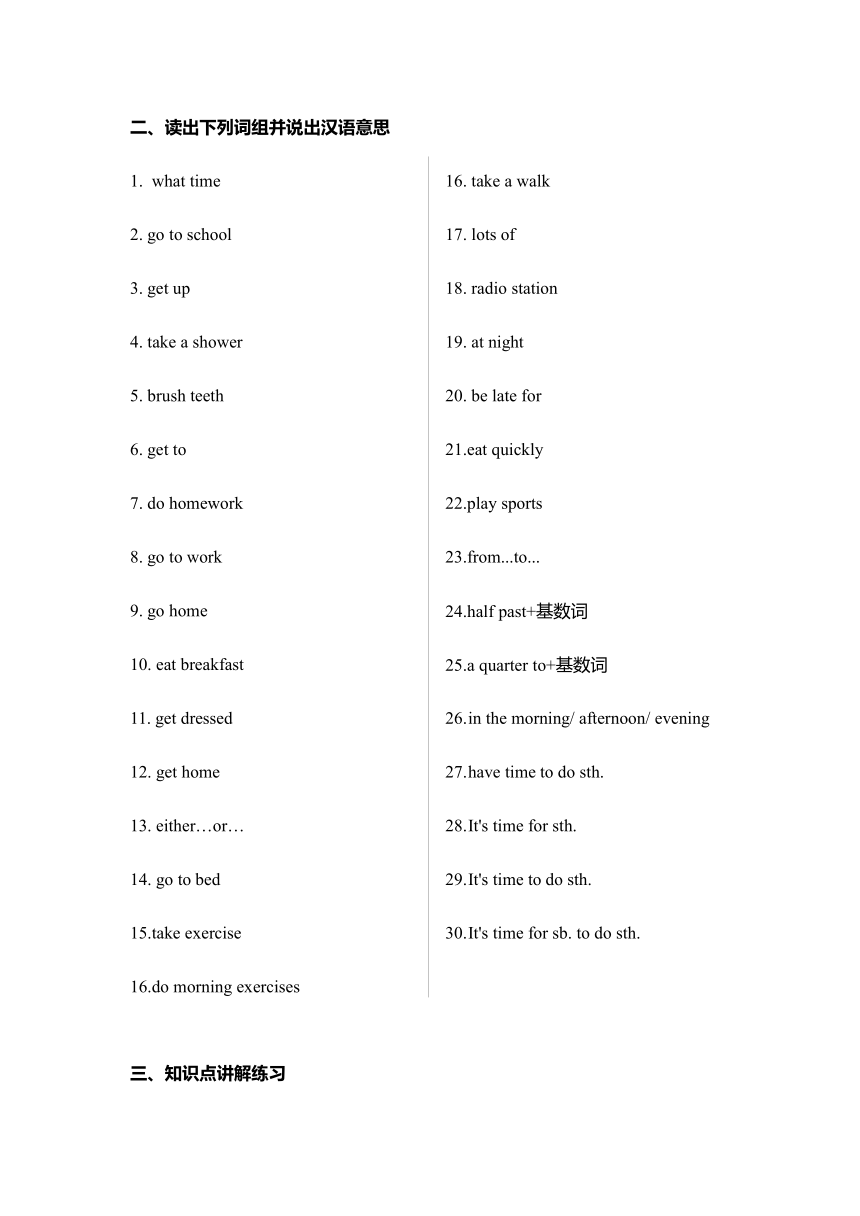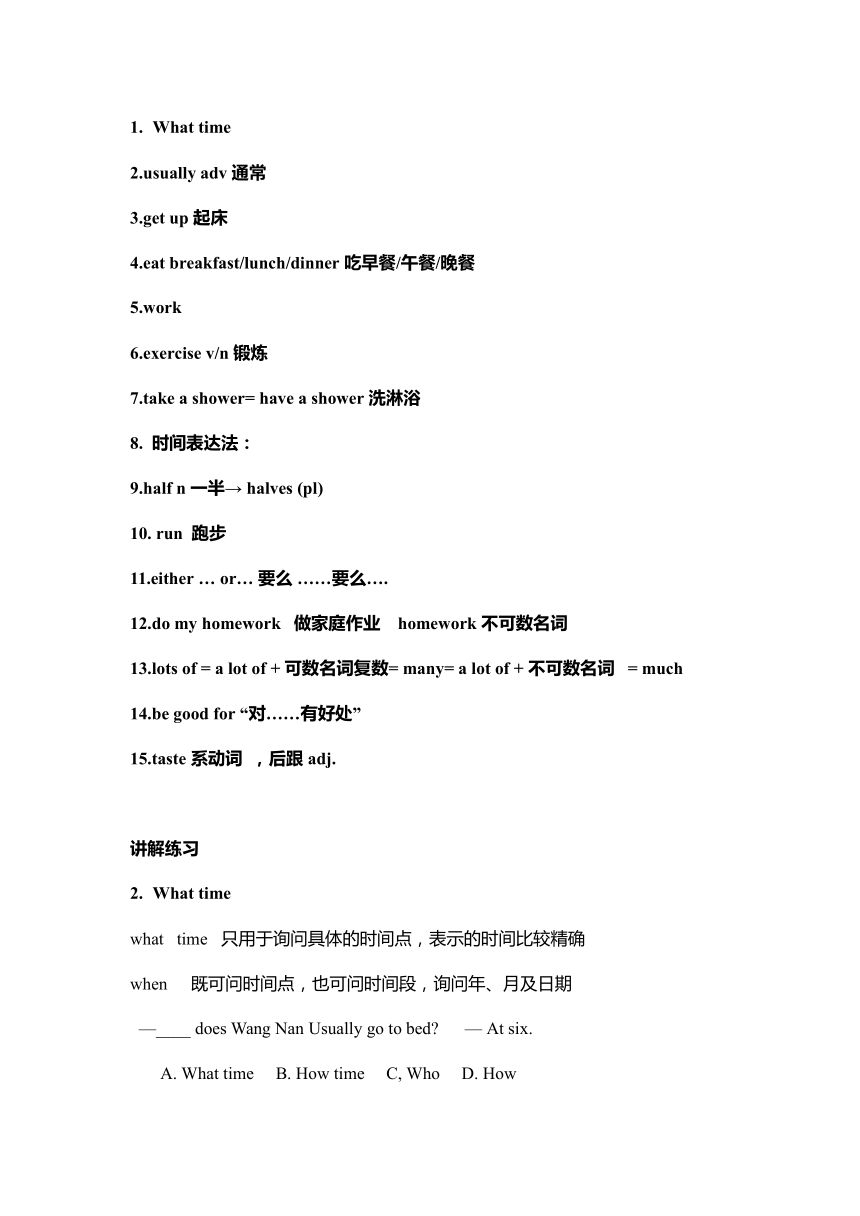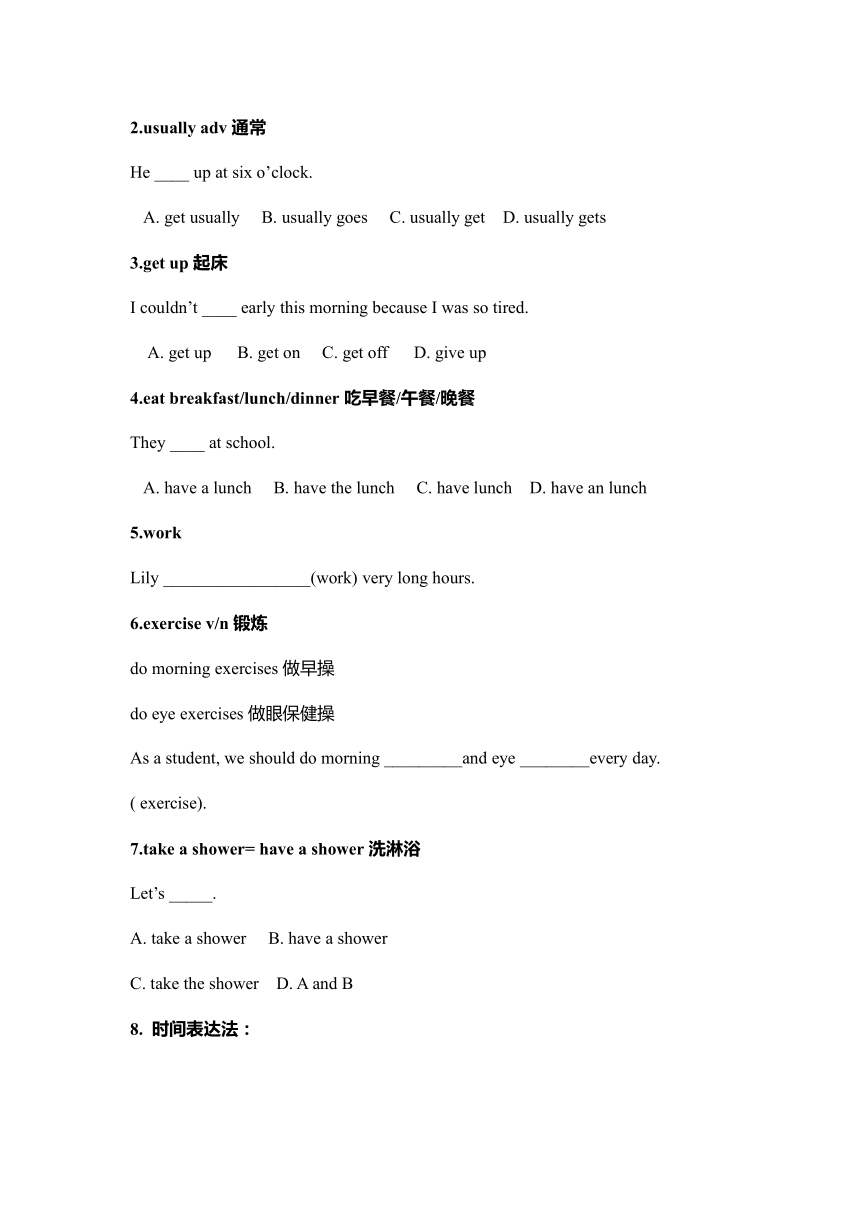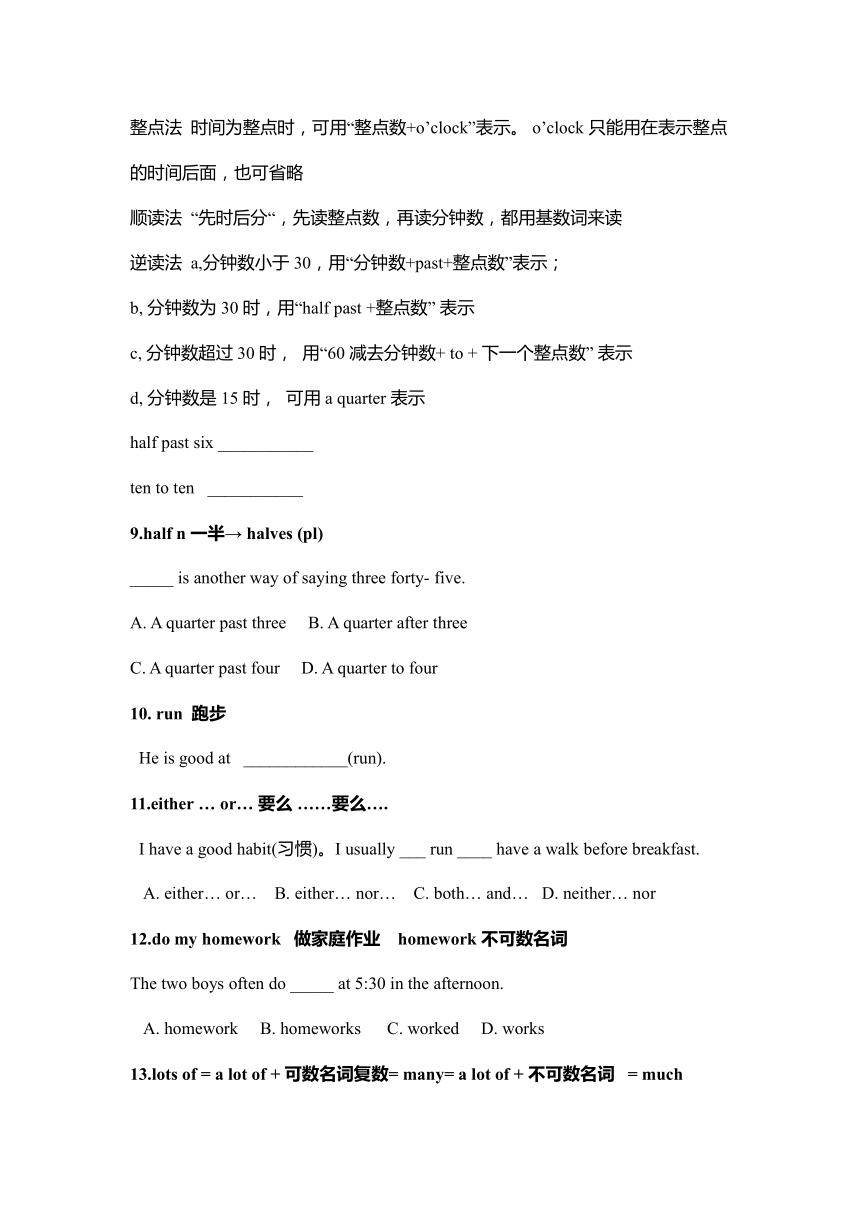Unit 2 What time do you go to school?知识点讲解练习 (无答案)
文档属性
| 名称 | Unit 2 What time do you go to school?知识点讲解练习 (无答案) |  | |
| 格式 | docx | ||
| 文件大小 | 26.6KB | ||
| 资源类型 | 教案 | ||
| 版本资源 | 人教新目标(Go for it)版 | ||
| 科目 | 英语 | ||
| 更新时间 | 2024-01-27 09:17:54 | ||
图片预览





文档简介
Unit 2 What time do you go to school
课本单词
up [ p] adv.向上
get up起床;站起
dress ['dres] v.穿衣服n.连衣裙
get dressed穿上衣服
brush [br ] v.刷;刷净n.刷子
tooth [tu θ] n. (pl. teeth[ti θ])牙齿
shower [' a ] n.&v.淋浴; n.淋浴器
take a shower淋浴;洗澡
usually ['ju u li] adv.通常地;一般地
forty ['f (r)t ] num.四十
wow [wa ] interj.(表示惊奇或敬佩)哇;呀
never ['nev ] adv.从来;绝不
early [' l ] adv.&adj.早(的)
fifty ['f ft ] num.五十
job [d b] n.工作;职业
work [w k] n.&v.工作
station ['ste ( )n] n.电(视)台;车站
radio station广播电台
o'clock adv.(表示整点)……点钟
night [na t] n.晚上;夜晚
funny ['f n ] adj.奇怪的;滑稽好笑的
exercise ['eks sa z] v.&n.锻炼;练习
on weekends(在)周末
best [best] adj.最好的 adv.最好地;最
group [gru p] n.组;群
half [hɑ f] n.&pron.一半;半数
past [pɑ st] prep.晚于;过(时间)adj.过去的
quarter ['kw t ] n.一刻钟;四分之一
homework ['h mw k] n.家庭作业
do (one’s) homework做作业
run [r n] v.跑;奔
二、读出下列词组并说出汉语意思
what time
2. go to school
3. get up
4. take a shower
5. brush teeth
6. get to
7. do homework
8. go to work
9. go home
10. eat breakfast
11. get dressed
12. get home
13. either…or…
14. go to bed
15.take exercise
16.do morning exercises
16. take a walk
17. lots of
18. radio station
19. at night
20. be late for
21.eat quickly
22.play sports
23.from...to...
24.half past+基数词
25.a quarter to+基数词
in the morning/ afternoon/ evening
have time to do sth.
It's time for sth.
It's time to do sth.
It's time for sb. to do sth.
三、知识点讲解练习
What time
2.usually adv 通常
3.get up 起床
4.eat breakfast/lunch/dinner吃早餐/午餐/晚餐
5.work
6.exercise v/n 锻炼
7.take a shower= have a shower 洗淋浴
8. 时间表达法:
9.half n 一半→ halves (pl)
10. run 跑步
11.either … or… 要么 ……要么….
12.do my homework 做家庭作业 homework 不可数名词
13.lots of = a lot of + 可数名词复数= many= a lot of + 不可数名词 = much
14.be good for “对……有好处”
15.taste 系动词 ,后跟adj.
讲解练习
What time
what time 只用于询问具体的时间点,表示的时间比较精确
when 既可问时间点,也可问时间段,询问年、月及日期
—____ does Wang Nan Usually go to bed — At six.
A. What time B. How time C, Who D. How
2.usually adv 通常
He ____ up at six o’clock.
A. get usually B. usually goes C. usually get D. usually gets
3.get up 起床
I couldn’t ____ early this morning because I was so tired.
A. get up B. get on C. get off D. give up
4.eat breakfast/lunch/dinner吃早餐/午餐/晚餐
They ____ at school.
A. have a lunch B. have the lunch C. have lunch D. have an lunch
5.work
Lily _________________(work) very long hours.
6.exercise v/n 锻炼
do morning exercises做早操
do eye exercises 做眼保健操
As a student, we should do morning _________and eye ________every day. ( exercise).
7.take a shower= have a shower 洗淋浴
Let’s _____.
A. take a shower B. have a shower
C. take the shower D. A and B
8. 时间表达法:
整点法 时间为整点时,可用“整点数+o’clock”表示。 o’clock 只能用在表示整点的时间后面,也可省略
顺读法 “先时后分“,先读整点数,再读分钟数,都用基数词来读
逆读法 a,分钟数小于30,用“分钟数+past+整点数”表示;
b, 分钟数为30时,用“half past +整点数” 表示
c, 分钟数超过30时, 用“60减去分钟数+ to + 下一个整点数” 表示
d, 分钟数是15时, 可用a quarter 表示
half past six ___________
ten to ten ___________
9.half n 一半→ halves (pl)
_____ is another way of saying three forty- five.
A. A quarter past three B. A quarter after three
C. A quarter past four D. A quarter to four
10. run 跑步
He is good at ____________(run).
11.either … or… 要么 ……要么….
I have a good habit(习惯)。I usually ___ run ____ have a walk before breakfast.
A. either… or… B. either… nor… C. both… and… D. neither… nor
12.do my homework 做家庭作业 homework 不可数名词
The two boys often do _____ at 5:30 in the afternoon.
A. homework B. homeworks C. worked D. works
13.lots of = a lot of + 可数名词复数= many= a lot of + 不可数名词 = much
We need _____ food every day.
A. a lot B. many C. lots of D. lot of
14.be good for “对……有好处”
I think drinking milk is good ____ our health.
A. for B. to C. with D. at
15.taste 系动词 ,后跟adj.
The pizza _____ good. I’d like some more.
turns B. sounds C. feels D. tastes
单元练习
一、单项选择
1.---What about to the supermarket with me
---That’s a good idea.
A. going B. to go C. went D. goes
2.-Do you want to join me for dinner -______ .
A. Yes, I’d love to. B That’s a good idea
C That’s for sure. D. Sorry, I’d love.
3.We couldn’t connect Malaysia MH370 _______ Mar8th,2014.
A. on B. to C. at D. of
4.Our teacher told us _______________ carefully in class.21
A. listen B. to listen C. listened D. listens
5.I’ll work hard to make a lot of money ______ I can buy a big house.
A. if B. because C. although D. so that
6.We can watch Beijing Opera _____ TV.
A. in B. at C. on D. from
7.My brother ____ TV every day.
A. watches B. watch C. watchs D. see
8.--______ do you usually go to bed --At six.
A. What time B. How time C. When D.A and C
9.Zhang Min usually gets up _______.
A. at six thirty B. at thirty six
C. on six thirty D. on thirty six
10. Rick often does ______ homework at 6:00.
her B. his C. my D. your
二、阅读
Hello, I’m Li Lin. I’m a student from a small village. We have classes at ten in the morning, because our homes are far from our school. My sister and I get up at 6:30 in the morning. Then we have breakfast at 7 o’clock. We always have some noodles for breakfast. We go to school at half past seven. We get to school at nine forty. After school, we also need to go back home. We talk and sing on the way home so we don’t think we are a long way from home.
When we get home, we do our homework first. Then we play with our dog. In the evening, we play chess. We don’t watch TV or play computer games because we don’t have a TV or a computer. At nine thirty, we go to bed.
Many people say we don’t have a good life, but we are happy.
1.Li Lin and his sister ________ on the way home.
A.Run B.talk and sing C.walk quickly D.play with their dog
2.Which of the following is TRUE about Li Lin and his sister
A.They go to bed at 9:30. B.They don’t do homework.
C.They aren’t happy. D.They always have bread for breakfast.
3.Which is the best title(标题)for the passage
A.Our school B.Our home
C.Our village school life D.How do we go to school
三、用括号内所给单词的适当形式填空
1. For lunch, I usually eat__________ (hamburger).
2. I often clean my room on __________ (weekend).
3. Here are your clothes. Go and get __________ (dress), please.
4. Then I __________ (quick) have a shower and eat breakfast.
5. Please take a __________ (shower) and go to bed.
6. Then I __________ (quick) have a shower and eat breakfast.
7. Please take a __________ (shower) and go to bed.
8. She often eats lots of __________ (vegetable) after lunch.
9. She knows ice-cream is not good for___________ (she).
10. Who is your__________ (good) friend in your class
四、完成句子
1.张老师善于与学生打交道。
Mr.Zhang students.
2.吉姆是个美国男孩,但是他会用中文讲有趣的故事。
Jim is an American boy,but he can interesting in Chinese.
3.莉莉喜欢和她妈妈做游戏。
Lily likes to her mother.
4.你能帮我买些水果吗
Can you some fruit
5.我不认识那些说英语的学生。
I don't know those .
6.他每天早上6:00起床。
He ____________ _____________ at 6:00 every morning.
7.Tom穿上衣服之后,迅速离开了。
After ___________ ___________ ,Tom leaves quickly.
8.他的儿子不喜欢刷牙。
His son doesn’t like ___________ __________ ____________.
9.我想洗个澡。
I want ____________ ____________ _____________ ____________.
10.我们不应该晚睡。
We shouldn’t ____________ _____________ __________ ______________.
五、句型转换
1. They often go home at 5:15(对划线部分提问)
_____ _____ do they often go home
2. Jim’s father often has lunch in his office.(改为一般疑问句)
____ Jim’s father often ____ lunch in his office
3. It’s time for school.(改为同义句)
It’s time _____ _____ _____school.
4. She eats lots of fruit and vegetables for lunch.(对划线部分提问)
_____ _____ she _____ for lunch
5. I usually go to bed at 9:00.(用Lucy代替主语,改写句子)
Lucy usually ____ _____ ____ at 9:00.
课本单词
up [ p] adv.向上
get up起床;站起
dress ['dres] v.穿衣服n.连衣裙
get dressed穿上衣服
brush [br ] v.刷;刷净n.刷子
tooth [tu θ] n. (pl. teeth[ti θ])牙齿
shower [' a ] n.&v.淋浴; n.淋浴器
take a shower淋浴;洗澡
usually ['ju u li] adv.通常地;一般地
forty ['f (r)t ] num.四十
wow [wa ] interj.(表示惊奇或敬佩)哇;呀
never ['nev ] adv.从来;绝不
early [' l ] adv.&adj.早(的)
fifty ['f ft ] num.五十
job [d b] n.工作;职业
work [w k] n.&v.工作
station ['ste ( )n] n.电(视)台;车站
radio station广播电台
o'clock adv.(表示整点)……点钟
night [na t] n.晚上;夜晚
funny ['f n ] adj.奇怪的;滑稽好笑的
exercise ['eks sa z] v.&n.锻炼;练习
on weekends(在)周末
best [best] adj.最好的 adv.最好地;最
group [gru p] n.组;群
half [hɑ f] n.&pron.一半;半数
past [pɑ st] prep.晚于;过(时间)adj.过去的
quarter ['kw t ] n.一刻钟;四分之一
homework ['h mw k] n.家庭作业
do (one’s) homework做作业
run [r n] v.跑;奔
二、读出下列词组并说出汉语意思
what time
2. go to school
3. get up
4. take a shower
5. brush teeth
6. get to
7. do homework
8. go to work
9. go home
10. eat breakfast
11. get dressed
12. get home
13. either…or…
14. go to bed
15.take exercise
16.do morning exercises
16. take a walk
17. lots of
18. radio station
19. at night
20. be late for
21.eat quickly
22.play sports
23.from...to...
24.half past+基数词
25.a quarter to+基数词
in the morning/ afternoon/ evening
have time to do sth.
It's time for sth.
It's time to do sth.
It's time for sb. to do sth.
三、知识点讲解练习
What time
2.usually adv 通常
3.get up 起床
4.eat breakfast/lunch/dinner吃早餐/午餐/晚餐
5.work
6.exercise v/n 锻炼
7.take a shower= have a shower 洗淋浴
8. 时间表达法:
9.half n 一半→ halves (pl)
10. run 跑步
11.either … or… 要么 ……要么….
12.do my homework 做家庭作业 homework 不可数名词
13.lots of = a lot of + 可数名词复数= many= a lot of + 不可数名词 = much
14.be good for “对……有好处”
15.taste 系动词 ,后跟adj.
讲解练习
What time
what time 只用于询问具体的时间点,表示的时间比较精确
when 既可问时间点,也可问时间段,询问年、月及日期
—____ does Wang Nan Usually go to bed — At six.
A. What time B. How time C, Who D. How
2.usually adv 通常
He ____ up at six o’clock.
A. get usually B. usually goes C. usually get D. usually gets
3.get up 起床
I couldn’t ____ early this morning because I was so tired.
A. get up B. get on C. get off D. give up
4.eat breakfast/lunch/dinner吃早餐/午餐/晚餐
They ____ at school.
A. have a lunch B. have the lunch C. have lunch D. have an lunch
5.work
Lily _________________(work) very long hours.
6.exercise v/n 锻炼
do morning exercises做早操
do eye exercises 做眼保健操
As a student, we should do morning _________and eye ________every day. ( exercise).
7.take a shower= have a shower 洗淋浴
Let’s _____.
A. take a shower B. have a shower
C. take the shower D. A and B
8. 时间表达法:
整点法 时间为整点时,可用“整点数+o’clock”表示。 o’clock 只能用在表示整点的时间后面,也可省略
顺读法 “先时后分“,先读整点数,再读分钟数,都用基数词来读
逆读法 a,分钟数小于30,用“分钟数+past+整点数”表示;
b, 分钟数为30时,用“half past +整点数” 表示
c, 分钟数超过30时, 用“60减去分钟数+ to + 下一个整点数” 表示
d, 分钟数是15时, 可用a quarter 表示
half past six ___________
ten to ten ___________
9.half n 一半→ halves (pl)
_____ is another way of saying three forty- five.
A. A quarter past three B. A quarter after three
C. A quarter past four D. A quarter to four
10. run 跑步
He is good at ____________(run).
11.either … or… 要么 ……要么….
I have a good habit(习惯)。I usually ___ run ____ have a walk before breakfast.
A. either… or… B. either… nor… C. both… and… D. neither… nor
12.do my homework 做家庭作业 homework 不可数名词
The two boys often do _____ at 5:30 in the afternoon.
A. homework B. homeworks C. worked D. works
13.lots of = a lot of + 可数名词复数= many= a lot of + 不可数名词 = much
We need _____ food every day.
A. a lot B. many C. lots of D. lot of
14.be good for “对……有好处”
I think drinking milk is good ____ our health.
A. for B. to C. with D. at
15.taste 系动词 ,后跟adj.
The pizza _____ good. I’d like some more.
turns B. sounds C. feels D. tastes
单元练习
一、单项选择
1.---What about to the supermarket with me
---That’s a good idea.
A. going B. to go C. went D. goes
2.-Do you want to join me for dinner -______ .
A. Yes, I’d love to. B That’s a good idea
C That’s for sure. D. Sorry, I’d love.
3.We couldn’t connect Malaysia MH370 _______ Mar8th,2014.
A. on B. to C. at D. of
4.Our teacher told us _______________ carefully in class.21
A. listen B. to listen C. listened D. listens
5.I’ll work hard to make a lot of money ______ I can buy a big house.
A. if B. because C. although D. so that
6.We can watch Beijing Opera _____ TV.
A. in B. at C. on D. from
7.My brother ____ TV every day.
A. watches B. watch C. watchs D. see
8.--______ do you usually go to bed --At six.
A. What time B. How time C. When D.A and C
9.Zhang Min usually gets up _______.
A. at six thirty B. at thirty six
C. on six thirty D. on thirty six
10. Rick often does ______ homework at 6:00.
her B. his C. my D. your
二、阅读
Hello, I’m Li Lin. I’m a student from a small village. We have classes at ten in the morning, because our homes are far from our school. My sister and I get up at 6:30 in the morning. Then we have breakfast at 7 o’clock. We always have some noodles for breakfast. We go to school at half past seven. We get to school at nine forty. After school, we also need to go back home. We talk and sing on the way home so we don’t think we are a long way from home.
When we get home, we do our homework first. Then we play with our dog. In the evening, we play chess. We don’t watch TV or play computer games because we don’t have a TV or a computer. At nine thirty, we go to bed.
Many people say we don’t have a good life, but we are happy.
1.Li Lin and his sister ________ on the way home.
A.Run B.talk and sing C.walk quickly D.play with their dog
2.Which of the following is TRUE about Li Lin and his sister
A.They go to bed at 9:30. B.They don’t do homework.
C.They aren’t happy. D.They always have bread for breakfast.
3.Which is the best title(标题)for the passage
A.Our school B.Our home
C.Our village school life D.How do we go to school
三、用括号内所给单词的适当形式填空
1. For lunch, I usually eat__________ (hamburger).
2. I often clean my room on __________ (weekend).
3. Here are your clothes. Go and get __________ (dress), please.
4. Then I __________ (quick) have a shower and eat breakfast.
5. Please take a __________ (shower) and go to bed.
6. Then I __________ (quick) have a shower and eat breakfast.
7. Please take a __________ (shower) and go to bed.
8. She often eats lots of __________ (vegetable) after lunch.
9. She knows ice-cream is not good for___________ (she).
10. Who is your__________ (good) friend in your class
四、完成句子
1.张老师善于与学生打交道。
Mr.Zhang students.
2.吉姆是个美国男孩,但是他会用中文讲有趣的故事。
Jim is an American boy,but he can interesting in Chinese.
3.莉莉喜欢和她妈妈做游戏。
Lily likes to her mother.
4.你能帮我买些水果吗
Can you some fruit
5.我不认识那些说英语的学生。
I don't know those .
6.他每天早上6:00起床。
He ____________ _____________ at 6:00 every morning.
7.Tom穿上衣服之后,迅速离开了。
After ___________ ___________ ,Tom leaves quickly.
8.他的儿子不喜欢刷牙。
His son doesn’t like ___________ __________ ____________.
9.我想洗个澡。
I want ____________ ____________ _____________ ____________.
10.我们不应该晚睡。
We shouldn’t ____________ _____________ __________ ______________.
五、句型转换
1. They often go home at 5:15(对划线部分提问)
_____ _____ do they often go home
2. Jim’s father often has lunch in his office.(改为一般疑问句)
____ Jim’s father often ____ lunch in his office
3. It’s time for school.(改为同义句)
It’s time _____ _____ _____school.
4. She eats lots of fruit and vegetables for lunch.(对划线部分提问)
_____ _____ she _____ for lunch
5. I usually go to bed at 9:00.(用Lucy代替主语,改写句子)
Lucy usually ____ _____ ____ at 9:00.
同课章节目录
- Unit 1 Can you play the guitar?
- Section A
- Section B
- Unit 2 What time do you go to school?
- Section A
- Section B
- Unit 3 How do you get to school?
- Section A
- Section B
- Unit 4 Don't eat in class.
- Section A
- Section B
- Unit 5 Why do you like pandas?
- Section A
- Section B
- Unit 6 I'm watching TV.
- Section A
- Section B
- Review of Units 1-6
- Unit 7 It's raining!
- Section A
- Section B
- Unit 8 Is there a post office near here?
- Section A
- Section B
- Unit 9 What does he look like?
- Section A
- Section B
- Unit 10 I'd like some noodles.
- Section A
- Section B
- Unit 11 How was your school trip?
- Section A
- Section B
- Unit 12 What did you do last weekend?
- Section A
- Section B
